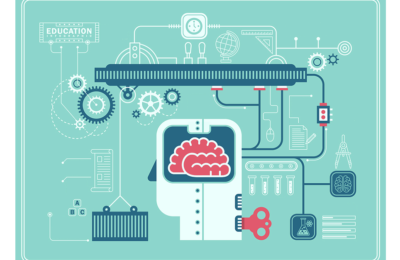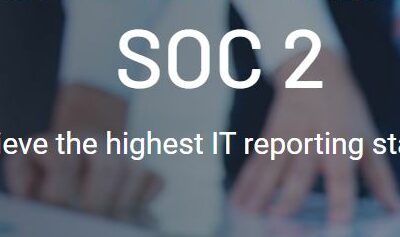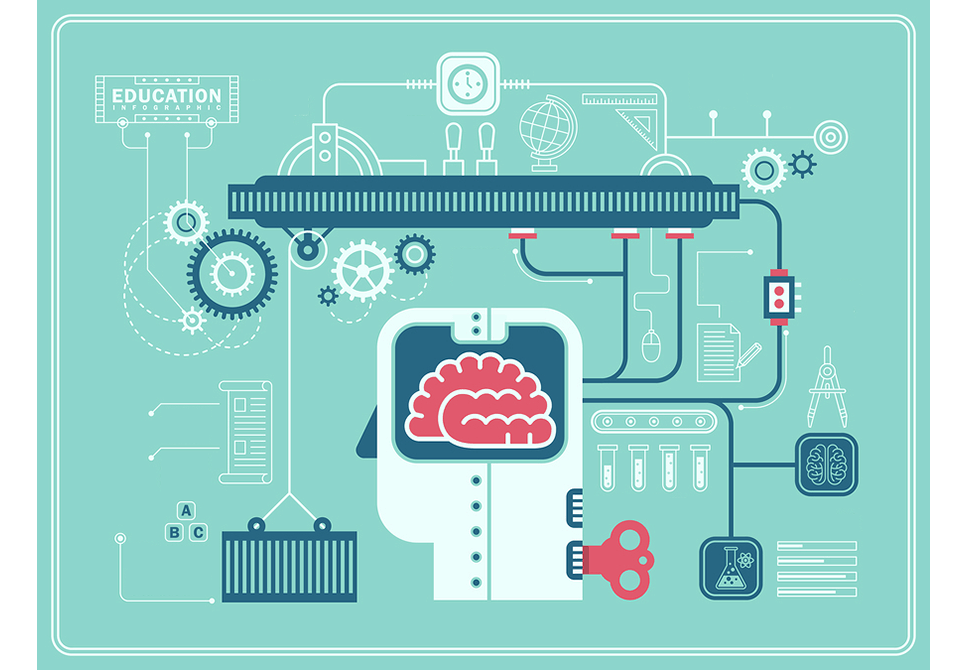EnlightenEd
Vision 2020 – Rise of the Machines to Save Higher Education

According to NCES, the 6-year graduation rate for first-time, full-time undergraduate students who began seeking a bachelor’s degree at 4-year degree-granting institutions in fall 2011 overall was 60 percent.
This statistic raises several issues – the obvious one is the fact that 40% of these students are dropping out of college and left with life-long debt. To make things worse, college dropouts generally earn $21,000 less per year than college grads, according to College Atlas. Another issue is the fact that it’s taking six years to complete a 4-year degree. In this current age of machine learning and predictive analytics – is there anything institutions can do to alleviate this crisis?
Our every entertainment whim is catered to by smart technology, with platforms powered by Artificial Intelligence, like Pandora and Amazon. These intelligent recommender platforms analyze our choices and behavior to recommend precisely the music, books, and even the groceries that we want before we even knew we wanted them.
Businesses can target their audiences online with pinpoint accuracy, taking advantage of Facebook and Google’s algorithms, and then continually refine their marketing campaigns in real-time based on the massive amounts of actionable data they’re presented with.
But when it comes to higher ed, which we look to as the formative experience of every young adult’s life, preparing them for their future careers and shaping the course of our nation?
We’re still dependent on people and paper, and there are limited applications of technology to solve the student success problem.
It just doesn’t make sense.
The world of education needs to be just as customized, targeted, predictive, and data-driven as the worlds of business and entertainment – perhaps even more so.
Providing students with the exact support and information they need to make the best choices for their college careers, and getting that same data into the hands of their advisors so they can jump in at precisely the right time with additional support as needed, at scale, is exactly what we need to move our nation forward, as individuals and as a whole.
- What if a mobile app could recommend courses for students based on how well other similar students have performed in those classes in the past?
- What if freshmen advisors had access to analytics that showed them the probability of a student dropping out at the end of freshman year?
- What if students could see the impact of a specific assignment score, midterm grade, or final grade on their overall academic progression?
- Wouldn’t customized information like this be a game-changer for students and colleges?
At N2N, we’ve created a solution to address this very issue.
Introducing the new Lighthouse module for N2N’s Illuminate platform: Download the N2N Lighthouse Data Sheet here.
More EnlightenEd Entries
EnlightenEd
Corona Times: Working From Home – A Startup CEO’s Perspective

“Things do not change; we change.”
Henry David Thoreau
I am pretty sure it was early February, I was on my way to work and heard on NPR that there was a chance that the Tokyo Olympics might get postponed this year. I laughed out loud, and I was 100% sure that this “coronavirus crisis” would be long gone by fall. I had the highest confidence in how the US healthcare system was so much better than Italy’s healthcare system. I just couldn’t see how we would “shut down” our economy because of a “stupid virus.” Also, I was “sure” that this virus would find a cure by the time it reached the United States.
During the month of February, we launched our “lunch and learn” program. This program provided all employees free lunches and we used this time to train the staff on different core technologies they needed to succeed at N2N. I certainly won’t claim that we conducted this training with the premonition of the impending office shutdown, but this training helped prepare us for the incoming tsunami.
I also had a nagging feeling that I was just being hopeful and wanted to prepare the company in case of a contingency. During one of my all-hands staff meetings in February, I informed the team that we would ensure that every team member would get a work-from-home device in preparation for this potential event. I had been discussing the coronavirus and its potential impacts on our offshore operations. We were worried about the proximity of our offshore development center to China, and the possibility of widespread infections if the epidemic reached India because of the overall population, population density, and just the cultural aspects of the country.
Though I was getting them the devices, I was worried about whether my company was ready for a scenario where everyone worked from home. I wondered aloud about the impact it would have on married employees with kids, and employees who lived with roommates, and whether they had suitable conditions to maintain a strict schedule and professional work environment. I was frankly hopeful that we could just maintain the status quo of allowing people to work from home on an ad-hoc basis.
During the early parts of March, as we heard more news about the impact of Coronavirus on Italy, it became clear that this pandemic would impact the US. I started discussing with my Directors and the team on a more regular basis how we could prepare as a team for this incoming disruption. While we made preparations – I was still in denial that this was inevitable. I was frankly hopeful that our geographical separation from Europe could protect us from mass casualties and societal disruptions. I think I was just refusing to see the facts at this point – ignoring all the evidence to the contrary, just because I did not want to face a total disruption of my personal and professional life. I was also concerned about the lives of my employees and their families in this process. Little did I know that our whole nation and worse – our executive leadership was much less prepared than we were. One can argue that they were similarly optimistic and hopeful that the virus would “die” before it reached the US, or it would disappear because of the summer, or that it was just like the flu, and nothing to worry about.
I have to agree that executive leadership of the nation and I were equally in denial about this crisis on March 15th. When one of my employees sent me an email that she wanted to work from home for a couple of weeks, I lost my temper completely. I am embarrassed with myself now – but at that moment, all I could think of was, how could someone shut everything down and not go out of their home, in fear? Why would we let fear dictate our lives? What’s the point of living if we cannot live freely? All of these were thoughtful questions to an emotional predicament, and I did not come to terms with it then. I openly inquired about these conditions in the most indifferent way possible. I was adamant that we needed to continue the status quo, and we shouldn’t give in to fear. Despite all these rejections – as I saw the news trickling down from Seattle and California, I started coming to terms with this new reality – that we would very likely have a significant portion of our staff working from home soon.
“When we are no longer able to change a situation – we are challenged to change ourselves.”
Viktor E. Frankl
After much resistance, I decided to take time and document all my concerns and discussed potential remedies for each of these concerns. Based on the input from my directors, we formulated new work from home policies and created guidelines on working from home. We shared this with employees and explained it to them in detail over a couple of Zoom sessions. We used these sessions not only to illustrate the guidelines but detail the management concerns on the reasons for these policy positions as well.
By the end of the second week of March, schools started shutting down, and that was when we knew we were in for the long-haul. We bought new laptops and distributed them to our staff by the end of the third week.
During the last two weeks of March, we had a few more work-from-home requests come in and accepted them with some deliberation and resistance. I continued in my position that having everyone work from home was “unhealthy” for the company and disrupted our team dynamic. As a result of this prejudice, I was quite reluctant to shut down the office – even when all the evidence alerted me to do otherwise. I was outraged about how this was impacting everything I had planned for this year and was still negotiating with each employee on their WFH request, the length of stay, and personally approving each request. I am not proud of this behavior. Frankly, I am embarrassed about how I behaved during this period.
We are a technology company, and well-suited for everyone to work from home. However – we had hired a few employees during Q1, and I was worried about their proper onboarding if everyone was working from home. I was also concerned about the boundary between my personal and professional lives. As a single dad, with kids at home, I was selfishly thinking about my ability to operate the company working from home. My resistance consumed the second half of March to the new norm – that everyone would be working from home for the next few days. I was trying to deny, resist, bargain, and use every trick in the book of a CEO. Despite these denials, the more I saw the news, the more I was convinced that this was unavoidable and that it was only a matter of time before we shut down the corporate office. I reluctantly prepared for this moment, but still hoped that it would never come. By the end of March, we were down to 25% of our staff working in the office. The rest were working from home, and I was able to understand why. We began making preparations to close down the office by the end of the month. I felt like we were ready, as we shared and explained the WFH policies, bought the needed infrastructure and provided training to the teams during the months of February and March. The “lunch and learn” training we had conducted in February served as a core foundation for all the staff members when we closed down the office at the end of March and allowed everyone to work from home starting April 1st, 2020.
We implemented tactical policies to meet every day at 9 am as a whole team instead of meeting twice a week. This daily meeting allowed us to get our days started with the right priorities. We are a flat organization at N2N, with a highly matrixed organization. I was concerned that our matrixed team approach would fall apart in this new model.
One of my biggest concerns about this work-from-home period was the potential loss of integration between the new employees and the staff that joined before them. I decided to bridge this gap by announcing a fun internal hackathon called N2N Exemplar to build applications using the Illuminate, Dell Boomi, and Ellucian Ethos platforms. The teams and projects selected by executive management and each side had two resources. The resources were asked to design, develop, present, and document their project to the whole staff. I frankly did not know what to expect when we kicked off the project, but I had hopes that this project would allow team members to collaborate and build products. Most importantly – this would create a sense of interconnectedness in this new normal. I also found a way to address my skepticism and lack of confidence in this new modality by creating a common platform to evaluate all my employees.
At N2N, we pride ourselves on building applications and software to transform education delivery, and the overall student experience. The last two months have revealed to me that I have a lot to learn about how my kids use their devices. I can only transform the student experience of the world if I learn how they operate. The quarantine period allowed me to see this firsthand.
The last two months have been very revealing to me on my own personal front as well. Working from home, with kids at home, was challenging during the first week, but we eventually made a schedule and set our boundaries for work and play. My son, daughter, and I have had many vacations over the years and traveled throughout the United States and some parts of Europe. However, the last two months of quarantine have transformed our relationship with each other in more ways than I can articulate. I detailed some of these experiences in my recent posts on LinkedIn.
On a professional front, I have been super impressed with my team on many fronts. They willingly complied with the policies and procedures and recommended additional strategies as well. Most importantly, some of them rose to the challenges of this new environment in ways I did not expect before. The Exemplar challenge revealed their professionalism and their collaborative spirits as well. I feel strongly that the last two months have made us stronger as a team and allowed me to have a deeper understanding of team dynamics and leadership strengths of individuals.
By the end of the month of April, we were more connected than ever, had built stronger inter-team relationships, and had broken down the boundaries between new employees and the rest of the staff. The staff also provided me with the needed confidence that we can work together no matter where we work from, and we can rise to any challenge, no matter how onerous this task is.
I remember a discussion I had with my college friend, Ravi Pydi, who advised me of their company policy; He suggested that “Working from home should not just be a privilege, but it should be a right for any employee that works in a software company.” I did not accept this policy when he told me this, but the last two months of forced lockdown and the mandatory work-from-home system allowed me to see the beauty of this statement and the power of the new normal. If I trust my employees, and if I believe my ability to monitor their performance, it should not matter where they work from and when.
Thanks to this crisis, I will be embarking on creating a Work From Home policy based on trust and respect, instead of relying on the old system of skepticism and privilege.
More EnlightenEd Entries
EnlightenEd
Fantasy Philosophy: Machiavelli vs. Kant?

Machiavelli, in his book The Prince gives us several incendiary quotes that, one could argue, serve as a reference for modern-day entrepreneurs. Machiavelli’s philosophy epitomizes the struggles of a modern entrepreneur and serves as a guide for surviving that “dog-eat-dog” world.
“It is double pleasure to deceive the deceiver.“
Niccolo Machiavelli
In today’s world of competition, it’s frequently easy to ignore ethics and morals and focus instead on profit margins and bottom lines. Machiavelli serves as a guide for most politicians and some entrepreneurs as he gives them a way to bend the rules to fit their needs.
“The promise given was a necessity of the past: the word broken is a necessity of the present.”
Niccolò Machiavelli
In Machiavelli’s world, morals, ethics, values, promises, are all relative – and all that matters is the victory at the end. But what exactly does that victory entail? Are money, fame, and power the real answer to our quests for our being? As you might have seen in my article on Plato’s Eudaimonia, one can have a fulfilled life if one focuses on reforming society through innovations. Nietzsche takes it to the next level and gives us a clear blueprint for overcoming societal pressures and vices to truly realize one’s inner potential.
While Plato and Nietzche lay out the high-level framework as to how far we can go, it’s hard to apply these ideas to daily practice. Imagine an average startup entrepreneur, struggling to support his fledgling business, trying to get through his next payroll, or worse – possibly trying to avoid bankruptcy because of his mounting financial obligations. I wrote about “going all-in” a few years ago to explain my journey during the initial phases of my startup; I am sure many of us had similar horror stories involving predator loans, merchant credits, vulture investors, financial consultants, and legal advisors and how we kept looking for the easy way out, only to realize that these shortcuts lead us to worse situations. The last thing an entrepreneur wants to think about while fighting these fires is some idealistic vision laid out by Plato, Socrates, Nietzsche, or any other philosopher for that matter. In times of struggle, all that matters is to figure a way out of the current crisis. At least that’s how I felt when things were hard for me.
While Machiavelli can claim to provide answers and justifications for breaking promises, being facetious and even being directly unethical at times to win at any cost does not fit my moral compass. In my personal opinion these measures might bring short-term wealth, but do not bring long-term fulfillment.
What’s the best way to solve this? Let’s apply cartesian skepticism to look at the solution from a different perspective.
I want to introduce Immanuel Kant, a Prussian German Philosopher from the Age of Enlightenment. Immanuel Kant is one of my favorite philosophers, as he provides a simple blueprint for decision making in his Categorical Imperative doctrine, and I have applied it in several sticky situations with great success over the years.
From Wikipedia –
A categorical imperative denotes an absolute, unconditional requirement that must be obeyed in all circumstances and is justified as an end in itself. It is best known in its first formulation:
“Act only according to that maxim whereby you can at the same time will that it should become a universal law.”
— Immanuel Kant, Grounding for the Metaphysics of Morals
According to Kant, we cannot operate on moral relativism, applying morals where convenient, and ignoring them when they are not. According to his reasoning, we first have a perfect duty not to act by maxims that result in logical contradictions when we attempt to universalize them.
Kant believed in the concept of perfect duties – in general, precise responsibilities are those that are blameworthy if not met, as they are an essential required duty for a human being.
“Act in such a way that you treat humanity, whether in your own person or in the person of any other, never merely as a means to an end, but always at the same time as an end.”
— Immanuel Kant, Grounding for the Metaphysics of Morals
Simply put,this maxim tells us that we should not consider fellow humans as some “means to an end” – in other words, we should not try to manipulate a fellow human being so that he can return a favor, or help us with a need. We should treat all humans with respect, and assume that they are autonomous and independent, and that their decisions oftentimes have no dependency on our actions.
“Thus the third practical principle follows [from the first two] as the ultimate condition of their harmony with practical reason: the idea of the will of every rational being as a universally legislating will.”
— Immanuel Kant, Grounding for the Metaphysics of Morals
The third formulation says that if everyone follows the first two formulations, there will be no need for laws and regulations. Humans will be able to reach a state of “self-legislation,” where each human will be able to make the right decision by following the first two formulations.
In business terms, this is the definition of the free market, or at least the utopian vision behind it. If each business works ethically, to win the business of customers, there will be no need for a regulatory body to enforce rules and regulations on these businesses.
“Act according to maxims of a universally legislating member of a merely possible kingdom of ends.”
— Immanuel Kant, Grounding for the Metaphysics of Morals
The fourth formulation describes a utopian world where each person is autonomous and working on these categorical imperatives, and ultimately making the world a better place (kingdom of ends). Imagine a world where every human acts in full awareness and adherence to their consciousness, acting in adherence to the first two formulations. Such a world would expect every human to be self-legislative, and this universe would not need any laws for social order. In this utopian world, every human being can be trusted completely to make the right decision at all times.
Business and Philosophy
The more I read Kant and Machiavelli and their perspectives on virtues, morals, and ethics, the more I wondered if any of these ideas are relevant to the world we live in. In the current climate, being called a “cut-throat” CEO is considered a great compliment for an entrepreneur, “shark” investor is a praise for a new banker, and being called a “vulture” is considered a good thing for a financial firm. Is this “dog-eat-dog” world ready for anyone other than Machiavelli? Frankly, Machiavelli seems like our true friend with quotes like these –
The fact is that a man who wants to act virtuously in every way necessarily comes to grief among so many who are not virtuous.
Niccolo Machiavelli
In the above quote, Machiavelli advises against acting virtuously, as most people in the world are not virtuous. However, by subscribing to the theory that some people in the world are not virtuous, some give themselves an excuse to break their own moral or ethical code of behavior.
I considered the ruthless world we live in, and how philosophy could be of any use in the challenges faced by modern entrepreneurs on a day-to-day basis. Like any other experiment, philosophy is best tested by considering some use cases.
Pet Walking
Imagine the following scenario – you are a pet owner, and you walk your puppy every morning and evening. You pick up after her every time, with the assumption that all other pet owners are doing the same, and you also know that it’s the “right thing to do.” What if one decides not to pick up after their pet, because some pet owners are not picking up after their pets? If you join the irresponsible pet owners, aren’t you making your neighborhood a worse place? In fact, if some pet owners forget to pick up after their pet, isn’t it the right thing to do to pick it up as well, just because?
In my pet walking example, applying the first formulation will look somewhat like this – “If I can make a universal law that no pet owner should pick up after their pet, I will stop picking up after my pet.” I am sure you will agree that such a law would be absurd – not to mention, our lawns would become unbearable as the result of such a law.
Applying Kant’s second formulation – “Pick up after a neighbor’s pet without any assumption that the neighbor will return your favor. Do this because this is the right thing to do.”
Applying Kant’s third formulation – “If all responsible pet owners follow the first formulation and pick up after their pet, and also pick up when an owner forgets without any expectation – all our gardens will be perfect!”
Applying Kant’s fourth formulation – “If all responsible pet owners follow the first formulation and pick up after their pet, and also pic kup when an owner forgets without any expectation, there will be no need for laws, regulations, fines, and tribulations to manage this pet waste problem.”
As far irresponsible pet owners are concerned, they might get some satisfaction from letting others take care of their basic responsibilities, but I am hopeful that they might feel guilty eventually, and decide to do the right thing. If they don’t have this basic level of conscience, their small violations often lead to bigger crimes and ultimately catch up to them.
If we can trust humans to be “self-legislating” with pet walking, then we should be able to trust humans in general on other matters as well. For the most part, humans don’t need laws – most of us wake up, get dressed, show up to work on time, take care of our families responsibly, and perform our duties as responsible citizens without the threat of punishment from the authorities. All of this comes from our internal core value system, and Kant believes that if we can strengthen that core with clear, non-negotiable guidelines (categorical imperatives), we can solve more complex problems as well.
Competitive Bidding
Imagine being in a competitive bidding war with another firm, but this other firm has always been unethical with their practices and quotes. One of your staff members advises you to be dishonest and provide a stronger bid in order to help you win the business. The reasoning? One can only defeat deceit with deceit.
Now let’s revisit the use-case of a bidding war with your unethical competitor, and see if the first formulation helps us. As always, you have two options:
- Machiavelli’s approach: Submit a dishonest proposal, and stay in the race. Promises are meant to be broken, remember?
- Categorical Imperative: Stay true to your values, and probably lose the submission to the unethical competitor.
In our example laid out above, if we adopt “It’s OK to be dishonest on a proposal to win against another dishonest bid,” as our maxim, we should be willing to take this as the universal law, and this implies that everyone should be able to cheat on their proposals. This eventually makes the bidding process useless and will make our dishonesty frivolous.
Loan in Crisis
The company is in a cash crunch because of a terrible year of losses. It would help if the company did whatever it could to survive. One of the ways the CEO could alleviate the problem would be by breaking promises to lenders, customers, and possibly employees.
For this use-case the second formulation helps us. As always, you have two options:
- Machiavelli’s approach: Pursue your plans to become a wealthy person’s friend, to manipulate this person and extract a personal loan at all costs.
- Categorical Imperative: Decide to come clean and not pursue this plan, at the expense of failing your business.
In the example above, if we follow Kant’s second axiom, we need to ignore the path that justifies deceit to solicit funds. However, once we decide that such a shortcut is no longer an option,we might think more clearly about following the right course of action, even if that means accepting failure in your business. Or there might be a more viable option, where you explain the perilous state of your business with complete honesty to this wealthy contact, provide him full details as to the risks involved, and allow him to make the decision. In my interactions with investors, friends, and associates, I have learned that providing the full picture might make you look vulnerable at times. However, being honest, even though it’s inconvenient to do so, allows you to treat your fellow human beings with the respect they most deserve.
Summary
Over the years, I am sure I have made some errors in my personal and business life. I can take stock of a few times I might have resorted to Machiavellian tactics at times. In those situations, I am pretty sure I ended up disappointed as a result. I never understood the cause of my disappointment instead of happiness, even when things worked. Thanks to my cartesian skepticism, I came across Kant’s categorical imperative. Kant’s doctrine gave me an unambiguous framework to make the right decisions, even in the most perilous of circumstances.
Let’s look at our use-cases and ponder the alternative of using Machiavellian tactics instead of Categorical Imperatives.
If one wins an award by making misleading statements, this person would live in fear that the customer might figure out his/her dishonesty eventually. Or even if the customer continues to trust them, he/she might end up failing on the project, as they were not a good fit to begin with.
Machiavelli’s prompt to “break a promise” might sound simple when the entrepreneur is in a bind. However, such breaches of trust can have a long-term impact on employee morale or put strains on your personal and business relations. More importantly, employees can decide to follow the entrepreneur’s lead and break their promises to the company when the company needs them most.
If one takes Machiavelli’s approach for deceiving a wealthy associate and taking loans from this person under false pretenses, this person’s subconscious might run into similar problems as he/she broke their morals and ethics and manipulated a fellow human being for his/her selfish ends.
I guess the above assertions about guilt might not apply for a person with no conscience. Machiavelli may speak to those people, lucky ones. However, I am a proud Kantian, and I will be satisfied with a life of minimal wealth, but opulent conscience – not the other way round.
More EnlightenEd Entries












